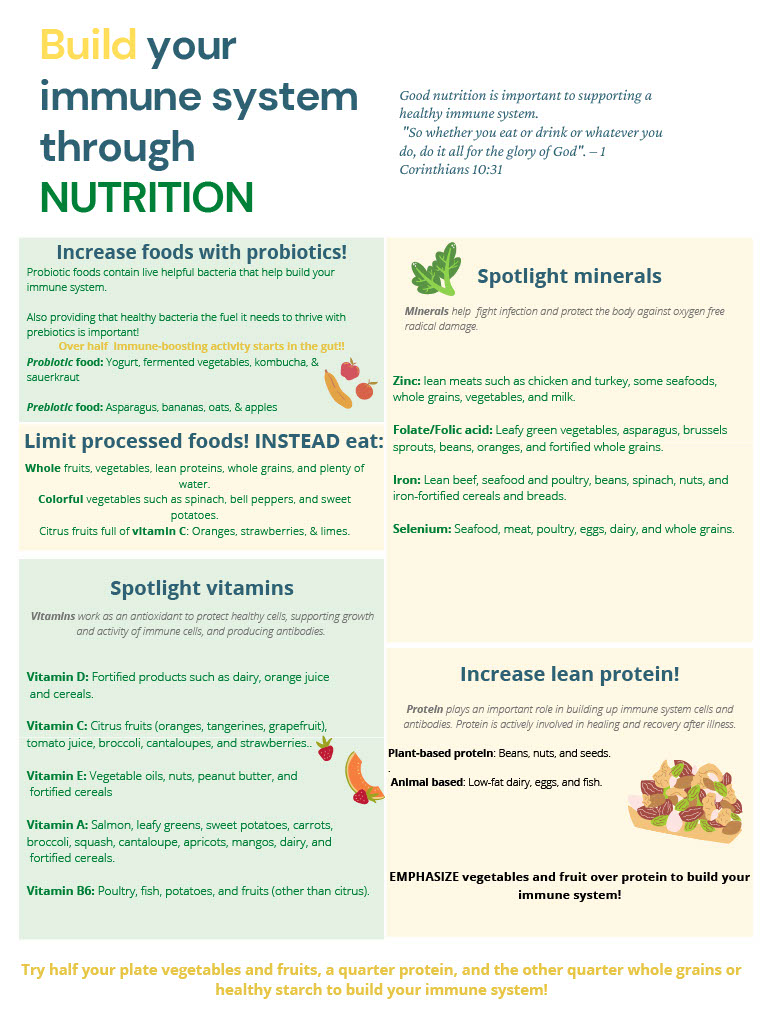How many burritos did you have this week? Three? Four? Is that also the number of hours of sleep you get per night? College students are notorious for unhealthy habits. Unfortunately, taking a daily vitamin does not magically undo sleep deprivation, bad nutrition and a stationary lifestyle. Daily choices to prioritize health are extremely important, especially amid the pandemic, and maintaining health and a strong immune system is essential.
PLNU professor Heidi Lynch, Ph. D. in physical activity, nutrition, and wellness, said in an email, “It is always important to get adequate sleep and to eat a nutrient-rich diet, but in times of extra stress, this is the case even more. The National Sleep Foundation encourages young adults (ages 18-25) to get 7-9 hours of sleep per night.”
In contrast to the recommended amounts, Point Loma Nazarene University freshman psychology major, Mia Olson, said, “I’d say I sleep around six to seven hours every night.”
Biology professor Dianne Anderson explains the importance of sleep based on its role in eliminating waste from our brains. Anderson said fluid fills and drains in your brain via small channels which cleanses it of extraneous material that build up during the day. She said, “No wonder you can feel discouraged or stressed at night, but the next morning after a good night’s sleep will have a better outlook on life. Most college students need 7.5 to 9 hours of sleep.”

Freshman psychology major Bella Morales said with midterms coming up she turns to methods of late night cramming to ease her testing anxiety. It seems students may need to set a time to stop hitting the books and start hitting the sheets in order to optimize their health.
Anderson emphasized the importance of eating a variety of fruits and vegetables in order to consume the recommended amounts of micronutrients. Variety is also needed in how the foods are prepared; eating raw and cooked vegetables will allow a broader spectrum of nutrients to be consumed. Anderson notes that the produce label of organic or GMO is less important than simply consuming a range of fruits and vegetables, which should accumulate to about 20 different plant foods per week.
Lynch noted the role of proper nutrition to our health, especially during the pandemic. She said, “Basically, there are no sure-fire prevention or treatment cures through food, but it’s wise to be eating a health, nutrient-rich diet, just to keep up our immunity (and to set us up for being healthy for life long-term).”
According to Lynch, a plate that constitutes a nutrient-rich diet would be half fruits and vegetables, a quarter of grains and/or starch and a quarter of lean protein. Healthy fats are good in moderation when prepping and cooking.
Morales said, “I’ll eat like two to three servings of vegetables a day, but if I’m paying attention I’ll eat six servings.”
Are you paying attention to what you’re consuming and making sure you’re eating green foods that differ from sour gummy worms and caramel apple lollipops?

You can get enough sleep and eat all the right foods, but if you fail to move your body and practice physical fitness, you will never reach your optimal health. We’re all spending ungodly amounts of time sitting in front of our computers, hunched over for hours of Zoom and homework. Such stagnancy in one’s lifestyle is sure to take a toll.
Ted Anderson, professor of kinesiology, points out while most people credit a lack of time for their failure to exercise, they still don’t exercise even as leisure time increased during the pandemic.
What are some ways on campus you can take time to move your body? Not only is the track open Sunday-Saturday 11 a.m – 2 p.m. and 7-9 p.m., but ASB President Nash Manker announced the opening of the weight shed via a school-wide email. Students are now free to workout in the weight shed Monday-Friday from 3-5 p.m. To comply with COVID-19 rules, students must show the result of their Campus Clear check-in, remain masked and sanitize equipment before and after use.
Olson said, “I really like swimming and playing water polo. I try to fit exercising in whenever I can and it helps me feel better.”
Living in the era of COVID-19 seems stressful enough, but pile on midterms and a presidential election and you’ve got a mound of stress larger than a weekend laundry load. Attempts to practice proper, holistic health can not only protect your immune system, but might also help you feel better as a student.
Nutritional consultant and registered dietitian, Carrie Gunn, is available to meet virtually with students for nutritional counseling. To begin this process, email her directly at cgunn@pointloma.edu.
Written By: Charis Johnston

